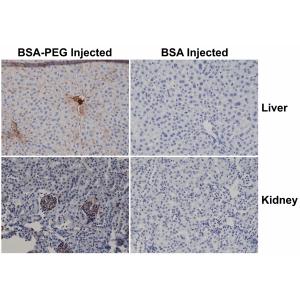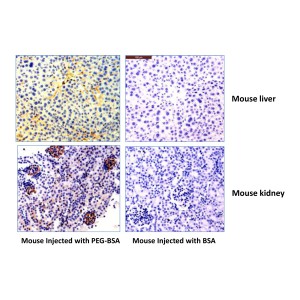
Immunohistochemical staining of formalin fixed and paraffin embedded LNCaP cells overexpressing HA-tag Bag1 protein, using anti-HA-tag rabbit monoclonal antibody (clone RM305) at 0.01 ug/mL.
anti-Polyethylene Glycol (methoxy group), Rabbit Monoclonal (RM105) (Biotin)
REV-31-1008-02
ApplicationsWestern Blot, ELISA, ImmunoHistoChemistry
Product group Antibodies
ReactivityAll Species
Overview
- SupplierRevMAb Biosciences
- Product Nameanti-Polyethylene Glycol (methoxy group), Rabbit Monoclonal (RM105) (Biotin)
- Delivery Days Customer2
- ApplicationsWestern Blot, ELISA, ImmunoHistoChemistry
- CertificationResearch Use Only
- ClonalityMonoclonal
- Clone IDRM105
- Concentration1 mg/ml
- ConjugateBiotin
- HostRabbit
- IsotypeIgG
- Scientific DescriptionPolyethylene glycol (PEG) is a nonbiodegradable hydrophilic polymer widely used in biomedical applications. It has good biocompatibility, is nonimmunogenic and is resistant to protein adsorption. It helps in the purification and crystal growth of proteins and nucleic acids. PEGylation is the act of covalently coupling a PEG structure to another larger molecule, for example, a therapeutic protein, which is then referred to as a PEGylated protein. The covalent attachment of PEG (PEGylation) is commonly used to modify a variety of proteins and drugs. Some of the therapeutical benefits of PEGylated molecules include increased bioavailability, increased blood circulation of the drug, optimized pharmacokinetics, decreased immunogenicity and decreased frequency of administration. Additional benefits of PEGylated molecules include decelerated renal excretion, improved stability towards proteolysis, increased solubility of the biopharmaceutical in aqueous solutions, increased hydrodynamic radius, reduced immunogenicity and proteolytic cleavage. - Recombinant Antibody. This antibody reacts to the methoxy group of Polyethylene glycol (PEG). It is specific for methoxypoly(ethylene glycol). Applications: WB, IHC, ELISA. Source: Rabbit. Liquid. 50% Glycerol/PBS with 1% BSA and 0.09% sodium azide. Polyethylene glycol (PEG) is a nonbiodegradable hydrophilic polymer widely used in biomedical applications. It has good biocompatibility, is nonimmunogenic and is resistant to protein adsorption. It helps in the purification and crystal growth of proteins and nucleic acids. PEG and dextran together result in aqueous polymer two phase system, which is required for the purification of biological materials. PEG also interacts with cell membrane, thereby allowing cell fusion.
- ReactivityAll Species
- Storage Instruction-20°C,2°C to 8°C
- UNSPSC41116161

